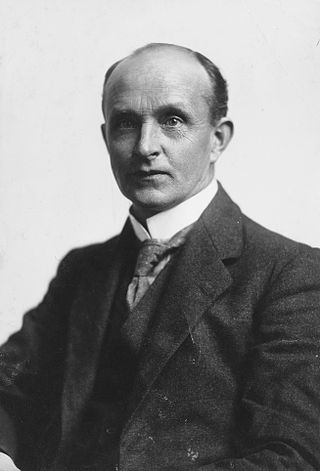Related Research Articles

William Sefton Moorhouse was a British-born New Zealand politician. He was the second Superintendent of Canterbury Province.

The 24th New Zealand Parliament was a term of the New Zealand Parliament. It opened on 23 February 1932, following the 1931 election. It was dissolved on 1 November 1935 in preparation for the 1935 election. The 24th Parliament was extended by one year because the 1935 election was held later than anticipated due to the ongoing depression, similarly the 1919, and the 1943 elections were held two years late, having been postponed during World War I and World War II respectively.
Akaroa was a New Zealand electorate. It was located in Banks Peninsula, Canterbury, and named after the town of the same name. One of the original 24 electorates, it existed from 1853 to 1893.
Ashley was a New Zealand electorate situated north of Christchurch. It was in use from 1866 to 1902, and was replaced with the Hurunui electorate.

Napier is a New Zealand parliamentary electorate, returning one Member of Parliament to the House of Representatives. It is named after the city of Napier, the main urban area within the electorate. The electorate was established for the 1861 election and has existed since. It has been held by Stuart Nash of the New Zealand Labour Party since the 2014 general election. Previously, it had been held by Chris Tremain of the New Zealand National Party, who stood down prior to the 2014 election.

New Plymouth is a New Zealand parliamentary electorate. It was first created for the 1st New Zealand Parliament in 1853 and has existed since, with one 32-year interruption. The electorate was initially called Town of New Plymouth.

Wairarapa is a New Zealand parliamentary electorate. It was first created in 1858 and existed until 1881. It was recreated in 1887 and has since existed continuously. In the early years, the electorate was for a time represented by two members. Wairarapa has been held by Kieran McAnulty since the 2020 election.

James (Jimmy) McCombs was a New Zealand Member of Parliament for Lyttelton.
Raglan is a former New Zealand parliamentary electorate. It existed for three periods between 1861 and 1996 and during that time, it was represented by 13 Members of Parliament.
Waimarino was a New Zealand parliamentary electorate that existed from 1911 to 1954, and from 1963 to 1972. It was rural in nature and was represented by four Members of Parliament.
Wallace was a New Zealand parliamentary electorate. It was established in 1858, the first election held in 1859, and existed until 1996. From 1861 to 66, it was represented by two members. In total, there were 18 Members of Parliament from the Wallace electorate.
Christchurch North is a former New Zealand parliamentary electorate. The electorate comprised the northern half of what is now considered the Christchurch Central City.
Hutt was a New Zealand parliamentary electorate. It was one of the original electorates in 1853 and existed during two periods until 1978. It was represented by 13 Members of Parliament.
Timaru was a parliamentary electorate, in New Zealand's South Island. It existed continuously from 1861 to 1996 and was represented by eleven Members of Parliament.
Cheviot was a parliamentary electorate in the Canterbury region of New Zealand, from 1858 to 1890. It was named after what was then one of the country's largest sheep stations, Cheviot Hills.
Wairau was a parliamentary electorate in the Marlborough Region of New Zealand. It was one of the initial 24 New Zealand electorates and existed from 1853 until its abolition in 1938, when it was succeeded by the Marlborough electorate. The electorate had 13 representatives during its existence. The 1861 election in the Wairau electorate was notable in that a later Premier, Frederick Weld, was unexpectedly and narrowly defeated by William Henry Eyes.
Wellington East was a parliamentary electorate in the eastern suburbs of Wellington, New Zealand from 1887 to 1890 and from 1905 to 1946. It was succeeded by the Miramar electorate. The electorate was represented by seven Members of Parliament.
Christchurch Country was a parliamentary electorate in the Canterbury region of New Zealand from 1853 to 1860. It was thus one of the original 24 electorates used for the 1st New Zealand Parliament.
Christchurch was a parliamentary electorate in Christchurch, New Zealand. It existed three times. Originally it was the Town of Christchurch from 1853 to 1860. From the 1860–1861 election to the 1871 election, it existed as City of Christchurch. It then existed from the 1875–1876 election until the 1881 election. The last period was from the 1890 election to the 1905 election. Since the 1946 election, a similarly named electorate called Christchurch Central has been in existence.
Ellesmere was a parliamentary electorate in the Canterbury region of New Zealand. It existed for two periods between 1861 and 1928 and was represented by six Members of Parliament.
References
- McRobie, Alan (1989). Electoral Atlas of New Zealand. Wellington: GP Books. ISBN 0-477-01384-8.
- Norton, Clifford (1988). New Zealand Parliamentary Election Results 1946–1987: Occasional Publications No 1, Department of Political Science. Wellington: Victoria University of Wellington. ISBN 0-475-11200-8.
- Scholefield, Guy (1950) [First published in 1913]. New Zealand Parliamentary Record, 1840–1949 (3rd ed.). Wellington: Govt. Printer.
- Wilson, James Oakley (1985) [First published in 1913]. New Zealand Parliamentary Record, 1840–1984 (4th ed.). Wellington: V.R. Ward, Govt. Printer. OCLC 154283103.